It's not only Donald Trump's refusal to concede the presidential election to Joe Biden that's dragging out the 2020 U.S. election cycle – away from distractions directed from Washington, political eyes are focused squarely on two pivotal Senate runoff elections in Georgia.
Voters in the southern state, which a recount completed on Thursday is expected to confirm went blue for the first time since 1992 in the presidential election, will determine whether the Democrats or Republicans control the Senate.

Clockwise from top left: Rafael Warnock, Kelly Loeffler, Jon Ossoff and David Perdue. /Getty
Clockwise from top left: Rafael Warnock, Kelly Loeffler, Jon Ossoff and David Perdue. /Getty
If Georgians elect Jon Ossoff and Rafael Warnock on January 5, Democrats will have a trifecta – control of the presidency and both houses of Congress – but if one or both of David Perdue or Kelly Loeffler prevail, Republicans will hold a majority in the Senate likely to lead to gridlock.
The runoffs, for which mail-in ballots were sent out from Wednesday, are also deeply entwined with the ongoing drama at the presidential level.
Republican leaders, desperate to keep the Trump base engaged to raise money and win votes in Georgia, are content not to confront the president's continued refusal to admit defeat. But in doing so, a damaging row has emerged within the party – and it's far from clear that their strategy won't be counterproductive.
Trifecta or gridlock
The Democrats won two Senate seats from the Republicans, who flipped one back, in the November elections, leaving the Republicans with a 50-48 advantage ahead of the Georgia runoffs.
If the Democrats win both and there's a 50-50 tie, projected vice president Kamala Harris would cast the deciding vote. If the Republicans win either, they will hold control of the chamber.
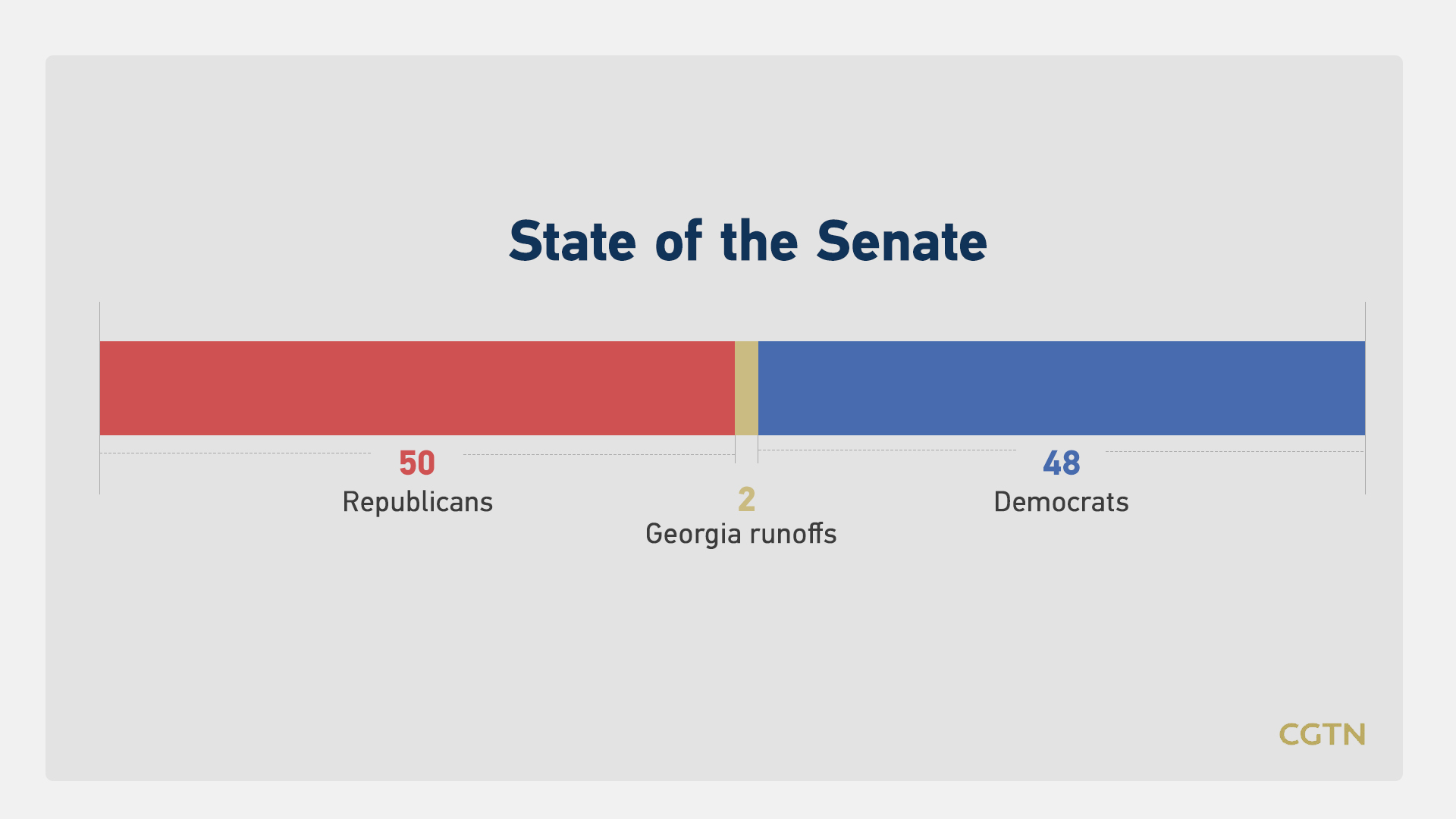
Biden's power to push through legislation as president will swing on the results in Georgia – if the Senate remains in Republican Mitch McConnell's control, the prospect of major legislation passing is minimal and the new man in the White House will likely have to resort to a swathe of executive orders that can be challenged in the courts.
The Democrat would be unlikely to be able to pass legislation on key issues like healthcare, voting rights and climate change, and could struggle to confirm Cabinet members or judges. If Ossoff and Warnock both win, the possibilities for Biden to enact far-reaching reforms would grow significantly.
The arithmetic
Georgians haven't elected a Democratic senator for over two decades and purely on the basis of the first round on November 3, the arithmetic isn't promising for Biden's party despite the former vice president winning the state.
The runoffs are taking place because Georgia requires the winner of elections to gain more than 50 percent of the vote, and in the first round no candidate surpassed that threshold.
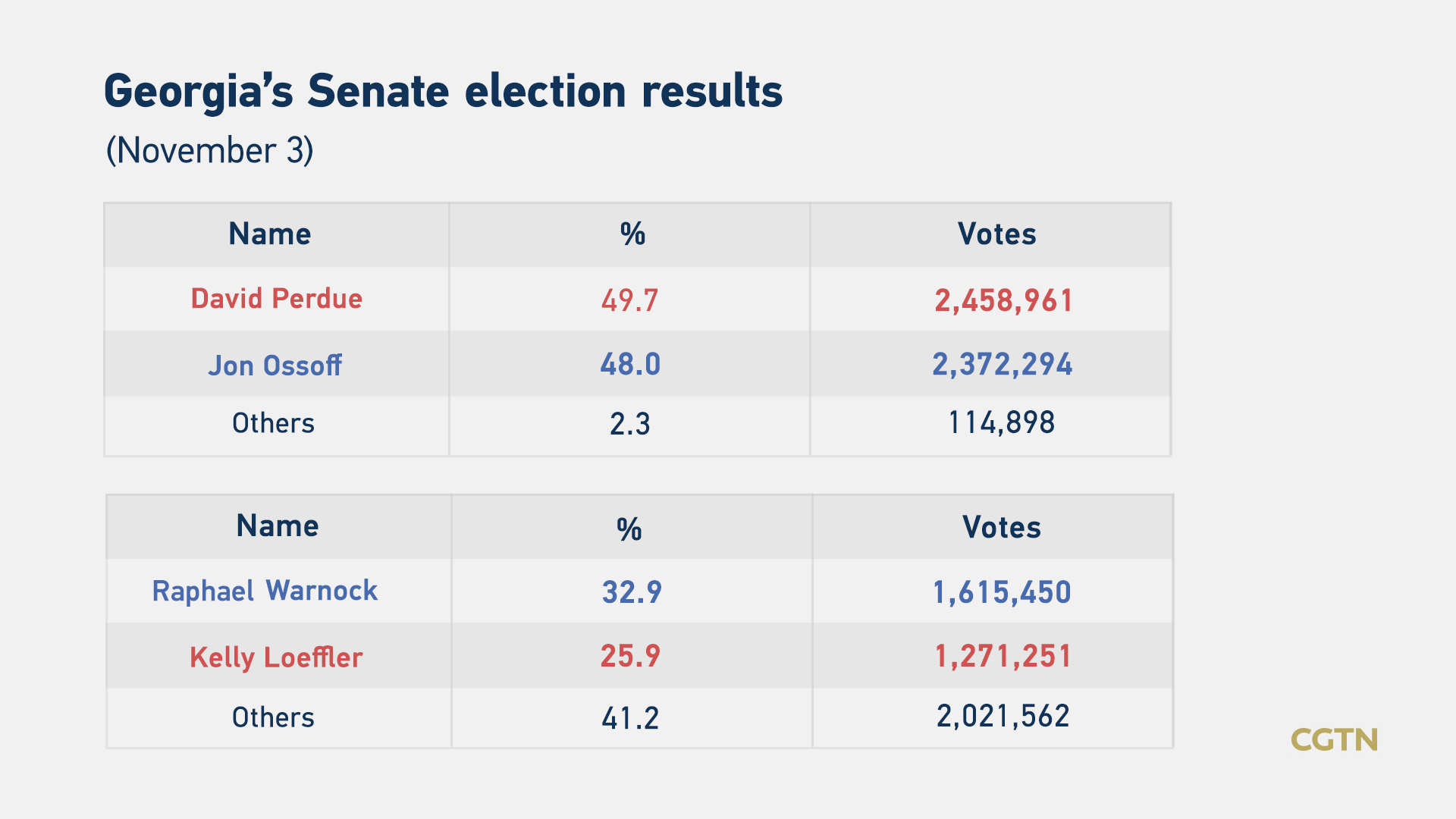
In the regular Senate election, incumbent Republican Perdue, a former businessman and strong Trump supporter, fell just 0.3 percentage points short of the 50 percent needed for an outright win over Ossoff, a 33-year-old documentary filmmaker who needs to make up over 85,000 votes in the runoff to turn the seat blue.
In the special election, called because Republican Senator Johnny Isakson resigned for health reasons at the end of 2019, there were no primaries so around 20 candidates took part – it was almost impossible for anyone to win more than half the votes.
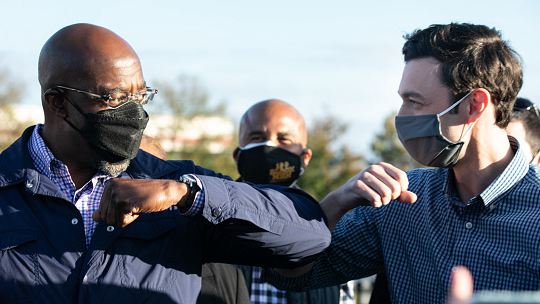
Raphael Warnock (L) and Jon Ossoff (R) taps elbows during a rally for supporters in Marietta, Georgia, November 15, 2020. /Getty
Raphael Warnock (L) and Jon Ossoff (R) taps elbows during a rally for supporters in Marietta, Georgia, November 15, 2020. /Getty
Two big-name Republicans – the appointed incumbent Loeffler, the wealthiest member of the Senate, and the Trump-backed Doug Collins – split the party's vote on 25.9 percent and 19.9 percent respectively, allowing Democrat Warnock to finish first with 32.9 percent of the vote,
That means Warnock, a pastor at Ebenezer Baptist Church in Atlanta, and Loeffler will face off – with 41.2 percent of voters in the first round, over two million people, potentially up for grabs.
The Trump factor
Take the presidential chaos out of the equation, and the basic messages of both campaigns would be relatively straightforward.
For the Republicans: vote for us to keep a check on the Biden administration and its liberal agenda.
For the Democrats: vote for us to keep Obamacare, double the minimum wage and get things done in Washington.

Trump supporters participate in the "Million MAGA March" in Washington, D.C., November 14, 2020. /Getty
Trump supporters participate in the "Million MAGA March" in Washington, D.C., November 14, 2020. /Getty
But the refusal of Trump to concede complicates the elections, in particular for Loeffler and Perdue, who have been forced into an unwelcome corner.
They have danced between publicly supporting Trump's claims of fraud – to keep the president and his most loyal supporters onside – and privately acknowledging, according to the Washington Post, that Biden will be the next president.
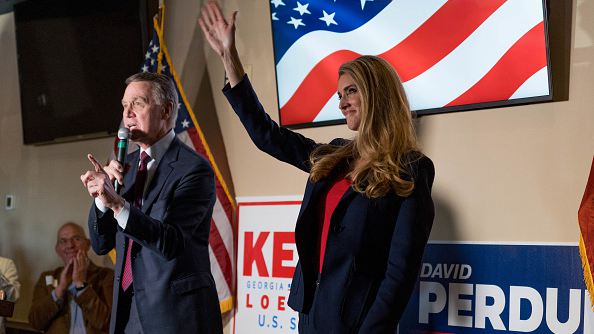
David Perdue (L) and Kelly Loeffler (R) speak at a campaign event in Cumming, Georgia, November 13, 2020. /Getty
David Perdue (L) and Kelly Loeffler (R) speak at a campaign event in Cumming, Georgia, November 13, 2020. /Getty
Thrown in has been a standoff between the Republican candidates and Brad Raffensperger, the Republican secretary of state, who insists the presidential election was fair. Loeffler and Perdue have said he should resign, widening a schism in the party at a time it needs it least.
The messaging, in pursuit of diehard Trump supporters, risks drowning out a core argument that could be effective in winning over swing or moderate voters. And there is also illogicality to the Trump base argument: driving turnout is critical in any election, but will people who believe there was fraud in the presidential contest trust their votes will be counted in a Senate race, or will they protest and not vote?
The variables
Operatives, supporters and hundreds of millions of dollars from both parties will descend on Georgia over the next six weeks, as the four candidates come under the national spotlight.
The variables in the race are immense: from turnout and the influence of Stacy Abrams, the Democrat who played a key role in expanding voter registration in Georgia and will hope to sign up more people before the December 7 deadline, to the power of outsiders coming into the state to campaign.
Out-of-state money and organizers aren't always welcomed by locals, but Biden and former President Barack Obama will almost certainly hit the trail and Trump may be tempted to join them if the Republicans look to be in a strong position.
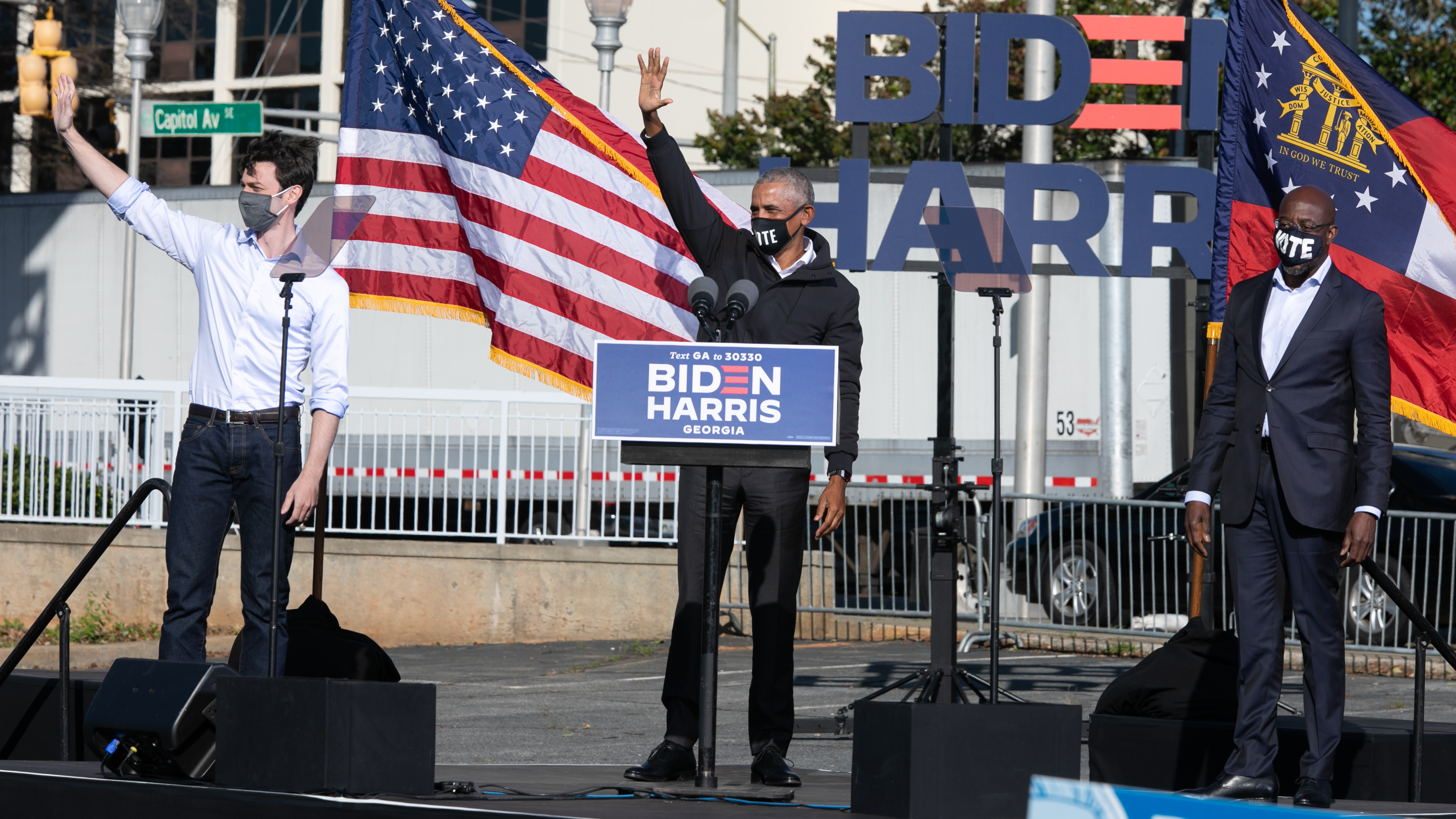
Barack Obama (C) waves to the crowd with Jon Ossoff (L) and Raphael Warnock (R) during a Drive-in Mobilization Rally, Atlanta, Georgia, November 2, 2020. /Getty
Barack Obama (C) waves to the crowd with Jon Ossoff (L) and Raphael Warnock (R) during a Drive-in Mobilization Rally, Atlanta, Georgia, November 2, 2020. /Getty
There are also questions for the candidates.
Ossoff made a name for himself with a series of viral moments on the trail – including embarrassing Perdue in a debate to the extent that the Republican has refused a rematch – but needs to do more to overturn a significant vote deficit, and Warnock has come under fire from Loeffler for an alleged connection to Fidel Castro.
Both Republicans, multi-millionaires who are essentially running on a unity ticket, have faced questions over their stock-trading in the early weeks of the COVID-19 pandemic.
For the projected Biden presidency, the elections in Georgia could be the difference between two years of action and two years of gridlock. And overhanging the contests remains the complicating Trump factor.

